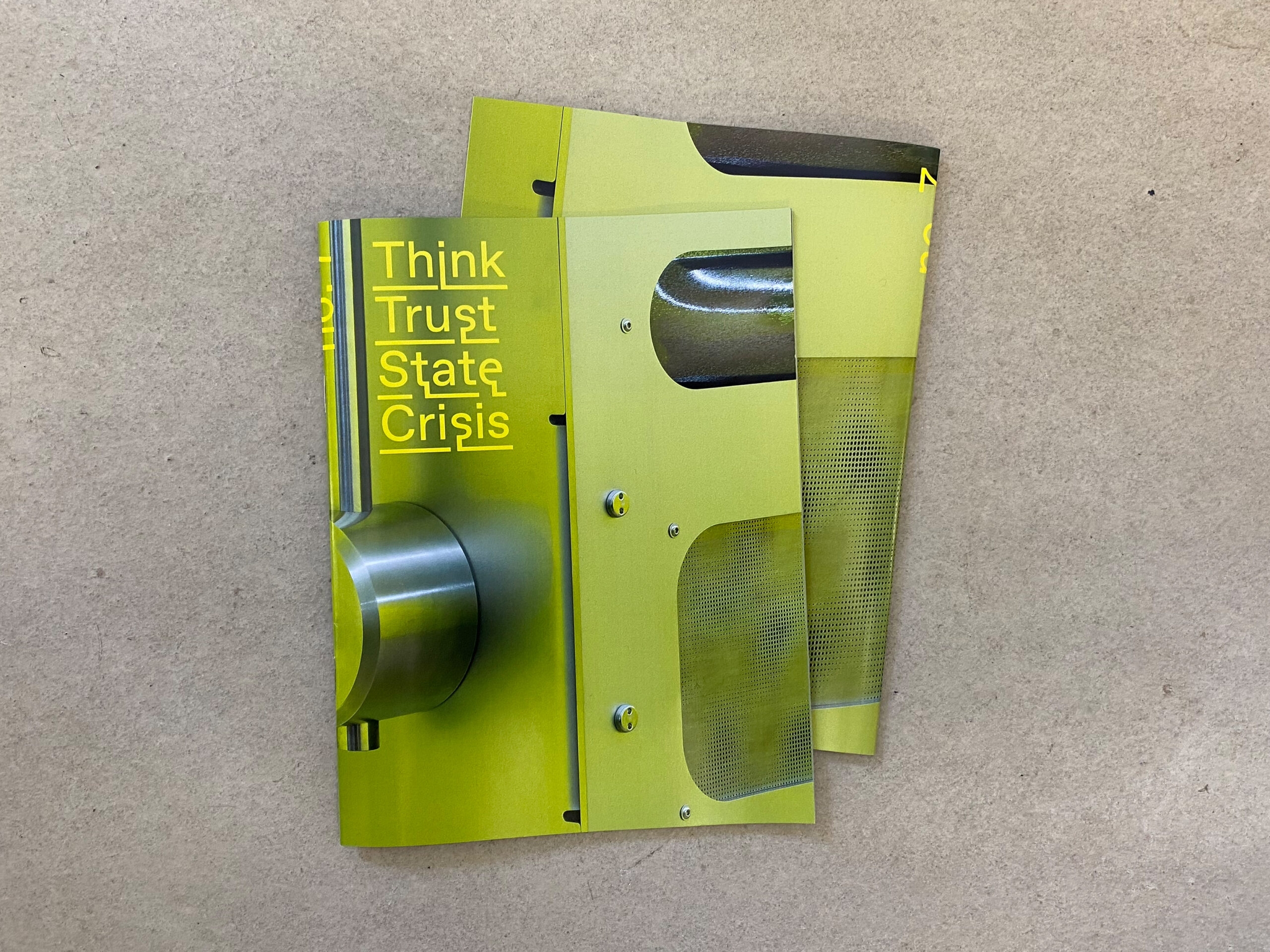No.7 Think Trust State Crisis
Matthias Lemke, Celia Martín, Olga Reznikova, Jak Ritger
buy print version (CHF 15 + shipping)
annual subscription (CHF 60 + shipping)
download PDF version
[EN] Field training. Two teenagers sitting on a table, drinking beer. People in safety vests approach them. Smoke streams across the floor, a fireman crawls along the hose into the building, his face covered with a sheet. In The Scenario House, a quarreling couple is threatening each other with weapons, the door bursts open and bodies stream in, pushing the man to the ground. Crises are tested and overcome; real life is experienced at first hand. Recognizing patterns enables us to act. However, crises are not to be found in natural conditions. They have to be repeatedly retold, problematized and brought to attention, as only an established crisis provides the source and legitimacy for change: New boundaries can then finally be drawn and new orders established. So, the question is how something is turned into a problem and by whom. And whether we want to be part of the problem, which may not be a problem, or its solution. In case of doubt, the crisis actor offers emotional guidance, but can their acting always be trusted? If the formula is wrapped in the right algorithm, the proposal for problematization can cause leverage effect – in other words, whoever convinces the most wins. The use of dark patterns and other dubious methods are not only permitted, they are the norm. With a little bit of luck, it will work. Think Trust State Crisis begins with an excursion into the unstable Europe of the post-war period, in which agents of paramilitary stay-behind networks were preparing underground for an invasion of the Soviet Union. In the politically motivated secrecy and concealment of evidence, Jak Ritger recognizes an important basis for the phenomenon of today’s fake news. Whether true or untrue, artificial intelligence doesn’t seem to care much, as Celia Martín makes clear from dubious advices in online forums. In its voracious appetite, AI is reproducing more and more erroneous data and on its rapid journey towards model collapse is revealing a crisis of trust. But a functioning democracy is also prepared for crises: Focusing on the state of exception anchored in democratic law as a regulatory instrument for that which cannot be regulated, Matthias Lemke introduces us to an ambivalent and dangerous form of crisis management that not only brought down ancient Rome, but also gives today’s democracies an authoritarian appearance. Against the backdrop of the danger that the state of exception could be declared the normal state, Olga Reznikova looks at a today’s authoritarian Russia and gives rise to hope where collective political possibilities for resistance no longer exist.
Think Trust State Crisis appears in dialogue with the exhibition Crisis Actor by Baker Wardlaw, which took place at For from 18.05. to 29.06.2024.
[DE] Feldtraining. Zwei Teenager sitzen auf einem Tisch, trinken Bier. Menschen in Warnwesten nähern sich ihnen. Rauch strömt über den Boden, ein Feuerwehrmann robbt am Schlauch entlang ins Gebäude, sein Gesicht mit einem Leintuch bedeckt. Im Scenario House bedroht sich ein streitendes Paar mit Waffen, die Tür springt auf, Uniformierte dringen ein und drücken den Mann zu Boden. Krisen werden erprobt und überwunden, die Realität des Lebens hautnah erfahren. Wird das Muster erkannt, befähigt es zum Handeln. Allerdings sind Krisen nicht im Naturzustand zu finden. Sie müssen immer wieder neu erzählt, problematisiert und mit Aufmerksamkeit belegt werden, denn erst eine anerkannte Krise bietet Grundlage und Legitimation zur Veränderung: Dann endlich können neue Grenzen gezogen und Ordnungen gebildet werden. Es stellt sich also die Frage, wie etwas von wem zum Problem gemacht wird. Und ob wir Teil des Problems, das vielleicht kein Problem ist, oder dessen Lösung sein wollen. Im Zweifelsfall bieten Crisis Actors emotionale Entscheidungshilfen. Doch können wir dem Krisenschauspiel wirklich trauen? Ist die Formel in den richtigen Algorithmus verpackt, bewirken Problematisierungsvorschläge Hebelwirkung – das heisst, wer die meisten überzeugt, gewinnt. Dark Patterns und sonstige unlautere Methoden sind nicht nur erlaubt, sie bilden die Regel. Mit etwas Glück funktioniert’s. Think Trust State Crisis beginnt mit einem Ausflug in das instabile Europa der Nachkriegszeit, in dem sich Agent*innen paramilitärischer Stay-behind-Netzwerke im Untergrund auf eine Invasion der Sowjetunion vorbereiteten. In politisch motivierter Geheimhaltung und Vertuschung von Evidenzen erkennt Jak Ritger eine wichtige Grundlage für das Phänomen heutiger Fake News. Ob wahr oder unwahr, das scheint auch die künstliche Intelligenz wenig zu kümmern, wie Celia Martín anhand von zweifelhaften Ratschlägen in Onlineforen deutlich macht. In ihrer unersättlichen Gefrässigkeit reproduziert die KI mehr und mehr fehlerhafte Daten und steuert auf ihrer rasanten Fahrt in Richtung Modellkollaps gleichzeitig auf eine allgemeine Vertrauenskrise zu. Doch eine funktionierende Demokratie ist auch auf Krisen vorbereitet: Mit Blick auf den rechtlich verankerten Ausnahmezustand als regulierendes Instrument des nicht Regulierbaren führt Matthias Lemke in eine ambivalente und gefährliche Form des Krisenmanagements ein, das nicht nur das alte Rom zu Fall brachte, sondern auch heutige Demokratien in autoritärem Antlitz erscheinen lässt. Vor dem Hintergrund der Gefahr, dass der Ausnahmezustand zum Normalzustand erklärt werden kann, richtet schliesslich Olga Reznikova den Blick auf ein heutiges autoritäres Russland und lässt dort Hoffnung aufkeimen, wo keine kollektiv-politischen Möglichkeiten des Widerstands mehr existieren.
Think Trust State Crisis erscheint im Dialog mit der Ausstellung Crisis Actor von Baker Wardlaw, die vom 18.05. bis 29.06.2024 bei For stattfand.
